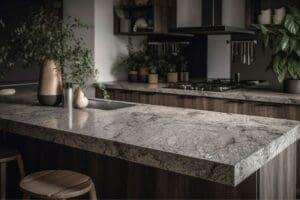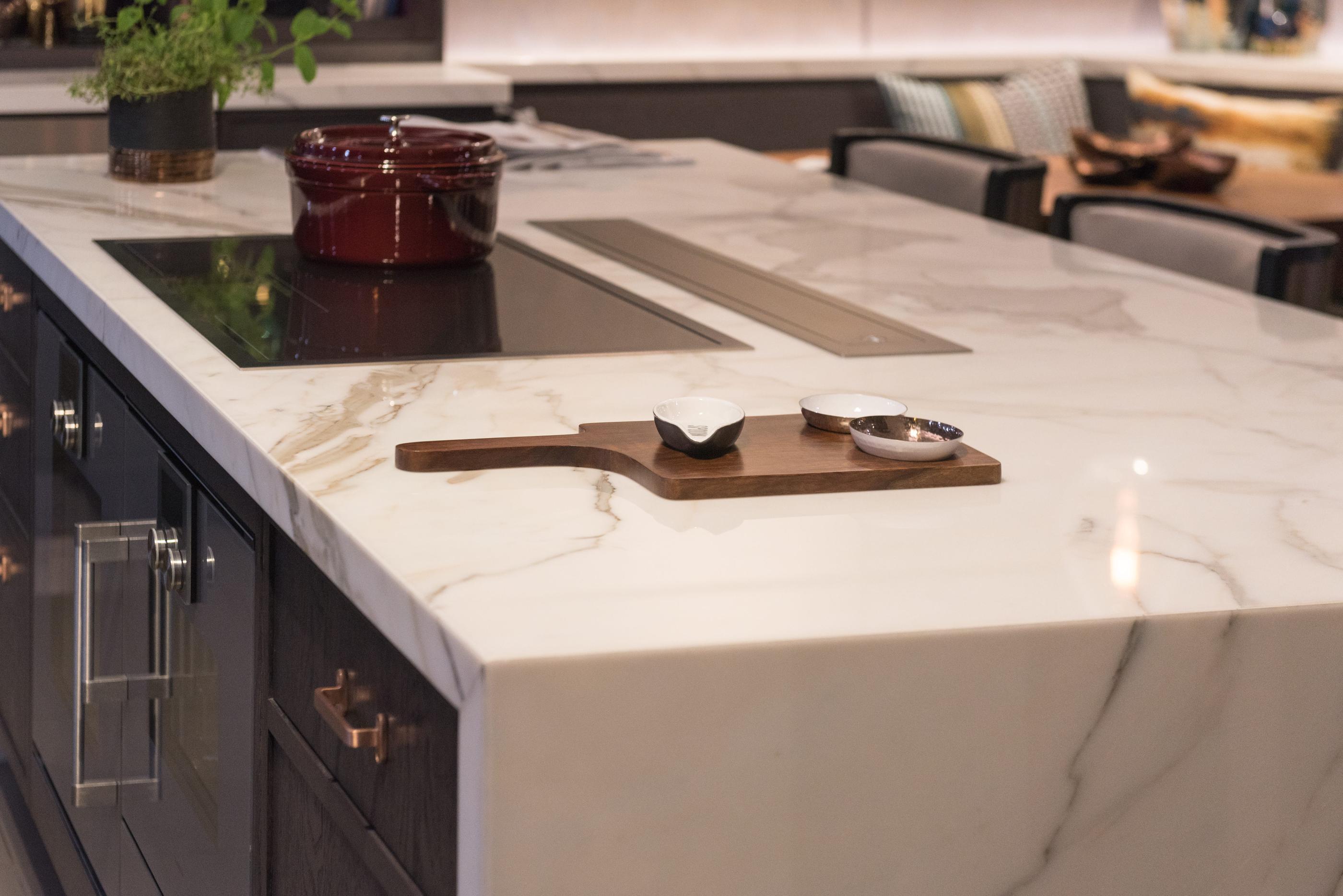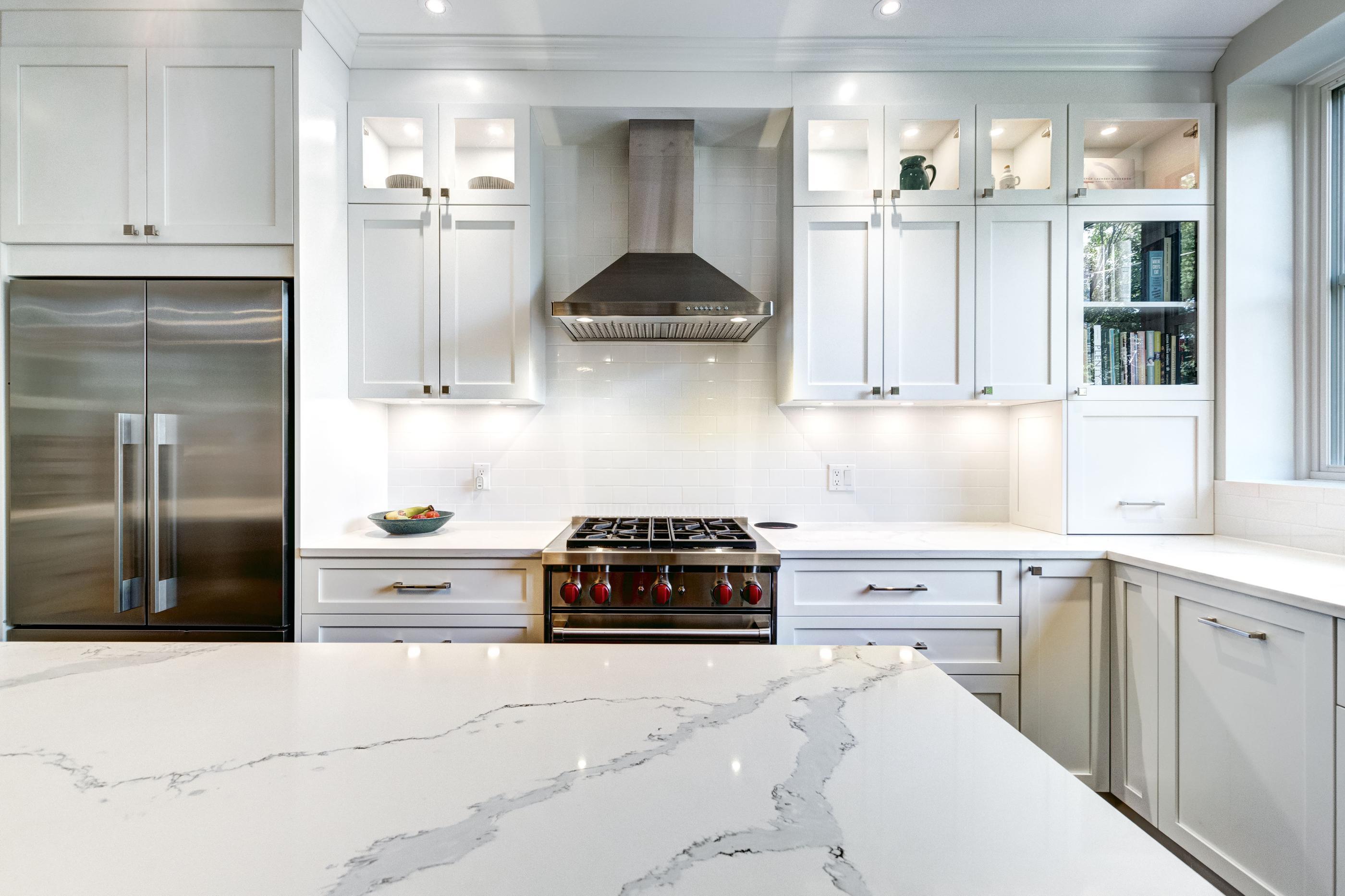Quartz is a durable and long-lasting material that is highly recommended for kitchen and bathroom countertops. Despite its toughness, exposure to water or excessive heat can cause damage. The following instructions will guide you on how to repair quartz countertops.
About Quartz Countertops
Quartz countertops are made from engineered stone, composed primarily of quartz crystals combined with resins and pigments. This blend creates a durable, non-porous surface resistant to scratches, stains, and heat.
Unlike natural stones such as granite or marble, quartz countertops are manufactured under controlled conditions, resulting in consistent coloration and patterns throughout the slab. Due to its composition, quartz is incredibly strong and resilient, making it an ideal choice for high-traffic areas like kitchens and bathrooms.
How Quartz Countertops Get Damaged
Here’s a quick overview of what can potentially harm your quartz countertops:
- Sharp objects: Quartz, although durable, isn’t completely immune to scratches from sharp items. Using sharp knives or heavy objects directly on quartz countertops can cause scratches and chips.
- Heat exposure: Quartz can withstand moderate heat, but prolonged exposure to temperatures higher than 300 degrees Fahrenheit can lead to thermal shock, causing cracks or discoloration in the surface.
- Use of chemicals: Harsh cleaning products like bleach or ammonia can damage the resin that binds the quartz particles together. This can result in discoloration or a dull appearance on the surface of the countertop.
- Water exposure: While quartz is resistant to water, it’s not entirely waterproof. If water is allowed to seep into the pores of the material, it can cause swelling or cracking of the surface over time.
Can Quartz Countertops Be Repaired?
Yes, quartz worktops can be repaired. It’s often a straightforward process, usually involving using materials like acrylic adhesive, epoxy, or clear resin to fill in any cracks or chips. However, checking the warranty on your quartz coutnertop beforehand is essential, as some repairs might be covered.
If the damage is significant or if you’re unsure about how to proceed, it’s always a good idea to consult a professional to ensure the repair is done correctly and doesn’t void any warranty agreements.
How to Repair Quartz Countertops
Quartz countertops, known for their durability, can still get damaged over time. The most common types of damage include:
- Chip in quartz: Chips usually happen when heavy objects are dropped onto the countertop or if it’s hit with a hard object, causing visible damage to the surface.
- Water damage: Although quartz resists stains, it’s not entirely immune. Stains can occur when certain substances are left on the surface for too long. Water stains, especially, are caused by mineral deposits found in hard water. These minerals can mix with the quartz, creating visible stains that affect the countertop’s appearance.
Whether dealing with chips from impact damage or water stains that can ruin the surface, let’s explore some tips and techniques to restore your quartz countertops to good shape.
How To Repair a Chip in a Quartz Countertop
Repairing quartz countertops is 100% possible when done right. But the severity of the damage can impact the ease of repair. Follow these instructions to repair a chip in a quartz countertop, but first, make sure you have all you need:
Tools needed to repair chipped quartz countertops
- A quartz repair kit that you can find available for purchase at hardware stores, home improvement centers, or online retailers. These kits typically contain everything you need to fill in chips and cracks, including adhesive and coloring agents. Alternatively, you can assemble your quartz repair kit with adhesive, coloring agents, mixing tools (mixing cups, stir sticks, or spatulas), and protective gear (gloves and eye protection)
- Clean cloth to wipe down the damaged area at the beginning of the repair process.
- Fine-grit sandpaper can be used to create a smooth surface once the adhesive has dried.
- A razor blade or scraper is used to remove any excess adhesive or residue after the repair is complete.
- Polishing compound to restore the shine and luster of your quartz countertop.
Instructions to repair a chip in quartz countertops
- Preparation – clean and assess: Begin by thoroughly cleaning the chipped area with a clean cloth, ensuring it’s free of dirt, dust, or debris. Assess the chip’s size and depth to determine the appropriate repair method.
- Adhesive preparation and application: Refer to the instructions provided with your quartz repair kit to prepare the adhesive thoroughly. Apply the adhesive to the chipped area, creating a slightly raised surface to ensure proper filling and bonding.
- Drying and curing: Allow the adhesive to dry according to the manufacturer’s instructions. This typically requires several hours for proper curing.
- Finishing touches: Once the adhesive is fully dried, gently sand down the repaired area using fine-grit sandpaper to achieve a smooth finish. Remove any excess adhesive or residue with a razor blade or scraper, being careful not to damage the surrounding quartz. Polish the repaired chip using a polishing compound to the repaired area to restore the shine and finish of your quartz countertop.
How Do You Fix Water Damaged Quartz Countertops?
To fix your water-damaged quartz countertops, use a non-abrasive cleaner gel:
- Apply a small amount of non-abrasive cleaner gel onto a damp cloth or paper towel, avoiding direct application onto the countertop.
- Gently wipe the stained area in a circular motion until the stain is removed.
To prevent hard water stains on quartz countertops, it’s essential to clean up spills promptly. Use a mild detergent and water to wipe away spills as soon as they occur, avoiding prolonged exposure to moisture.
Tips to Maintain Your Quartz Countertops
By following these tips, you can ensure that your quartz countertops remain in top condition.
- Wipe up spills immediately: Whenever there’s a spill on your quartz countertops, wipe it right away. This helps prevent the liquid from seeping into the surface and causing damage.
- Avoid harsh chemicals: Harsh chemicals like bleach or ammonia can harm the protective layer of your quartz countertops, leading to discoloration or dullness. Stick to gentle, non-abrasive cleaners to keep your countertops looking their best.
- Use coasters and trivets: Placing coasters under glasses and trivets under hot pots and pans helps protect your quartz countertops from scratches and heat damage.
- Be cautious with heavy objects: Using cutting boards or protective mats when handling sharp or heavy items provides a buffer and reduces the risk of chipping. Also, when lifting or moving heavy objects, be mindful of their weight and consider using both hands or enlisting assistance to prevent accidental drops or impacts on the countertop.
Conclusion
Repairing quartz countertops is manageable with the right tools and techniques. By understanding the common causes of damage, following the step-by-step repair instructions, and implementing simple maintenance tips, you can ensure your quartz countertops look great for years to come. With proper care, your countertops will continue to be a durable and stylish addition to your kitchen or bathroom.




